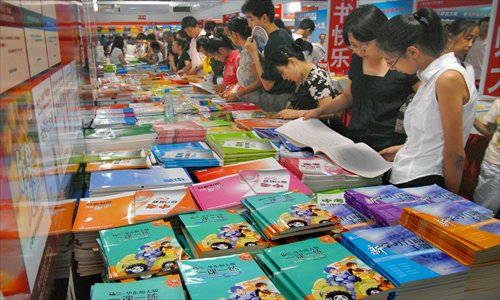Are we efficient enough?
After teachers, UK asks China for math workbooks

Book lovers attend the Shanghai book fair in August, 2008. Photo: CFP
It seems the exploration into the possibility of introducing Chinese teaching methods to Britain isn't going to end along with the just finished BBC documentary Are Our Kids Tough Enough? Chinese School, in which five Chinese teachers were invited to teach a class of 50 students in a British high school for one month.
On Wednesday in Shanghai, the East China Normal University Press Ltd held a press conference at the Shanghai Book Fair (August 19-25) to announce that on August 10, HarperCollins Publishers had published a British version of East China Normal University Press' math workbook for Shanghai students.
The original Chinese math workbook series, titled Yi Ke Yi Lian (Lit: one lesson one exercise), is comprised of 12 volumes catering to students from grades 1-12. The British version has a new name, The Shanghai Maths Project and comprises 11 volumes aimed at the British curriculum.
According to Wang Yan, director of East China Normal University Press, after the first volume on August 10, the next volume will come out in late August and the third and fourth volumes in October.
In the future, the publishing house plans to adapt new versions for South Korean, Russian and Bulgarian schools, Wang said.
Since 1995, the Yi Ke Yi Lian series, which includes workbooks for math, Chinese and English, has become a famous brand among Shanghai students, to the point it takes up almost 80 percent of the Shanghai market.
In 2009 and 2012, Shanghai students ranked first place in the Program for International Student Assessment, a triennial international survey that evaluates education systems worldwide.
The results of the survey mad Chinese education the center of global discussion. Li Shiqi, a math professor and PhD advisor at East China Normal University, told the Global Times that since 2009, countries such as the US, UK and Spain have visited Shanghai and joined math education forums in the city.
In February, HarperCollins Publishers, one of the five largest English-language publishing houses in the world, signed a contract with East China Normal University Press to begin working on The Shanghai Maths Project. The project is being led by Fan Lianghuo, an education professor at the University of Southampton who coauthored How Chinese Learn Mathmatics and How Chinese Teach Mathematics with math professors from the US and China.
"Some people tend to think Chinese workbooks on teach through the use of repetition and memorization, but this is wrong," said Li.
"We believe in theory that practice make perfect, and so in our workbook we try different ways to designing questions, which helps students understand what is being taught."
To avoid culture differences, The British version has made several changes from the Chinese version while maintaining the original difficulty level. For instance, in a match game, the Chinese version matches a bird to a cage and a cat to a fish, but the British version matches a bird to a tree and a cat to a mouse. In addition, the British version will also include some information that isn't contained in the Chinese book due to the different curriculums in the two countries.
Michael Herd, from Scotland, has been teaching math in an international school in Shanghai for seven years. He admitted that there are huge differences in teaching method between the UK and China, as the former is very much student-focused while the latter is much result-driven.
"I feel in the UK the teachers are more worried about how to make the students feel good about themselves rather than try to get them to perform the best academically," said Herd.
Hearing about the chaotic scenes in the BBC documentary that took place while students were in class, Mike said that this may be because the British students knew the program was purely experimental and so didn't take it that seriously.
When asked about whether he will consider using The Shanghai Maths Project workbooks, Herd said the he will get a copy to read through before he makes any decisions.
"Certainly I'm sure that the book would be probably very useful," said Herd.
"It probably can be used as an additional resource, but I'm not so sure whether it will replace resources that we already have."